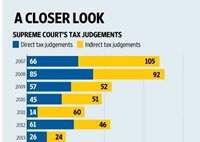pendency
“Legal system collapsing under Pending Cases: Supreme Court 55,000+, High Court 37 Lakh+, Lower Courts 2.6 Crore+. Yet, a staggering 400 High Court and 6,000 Lower Court judges not appointed, while Law Minister preoccupied peddling fake news,” tweeted Congress president Rahul Gandhi over the weekend, according to India Today.
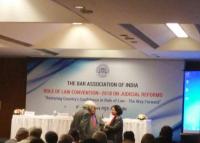 Senior advocate JP Cama called for a mandamus to bulldoze the process of judicial appointments and prevent judicial vacancy of nearly 45% at the Supreme Court, which is expected in the next 11 months.
Senior advocate JP Cama called for a mandamus to bulldoze the process of judicial appointments and prevent judicial vacancy of nearly 45% at the Supreme Court, which is expected in the next 11 months.
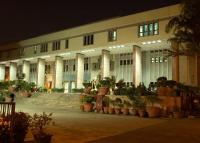 Senior advocate Harish Salve helped the Delhi high court approve, but not yet notify, a set of new rules which would enable it to impose a staggering and unprecedented amount of costs on litigants filing frivolous cases before it, encourage video-conferencing trials and reduce litigation time in other ways.
Senior advocate Harish Salve helped the Delhi high court approve, but not yet notify, a set of new rules which would enable it to impose a staggering and unprecedented amount of costs on litigants filing frivolous cases before it, encourage video-conferencing trials and reduce litigation time in other ways.
Cutting Through the Clutter: India Takes First Steps to Unleash More Effective Commercial Litigation
 No country can attract foreign trade and investment without a modicum of rule of law and stability in governance. Rule of law requires not only a set of easily understood norms and procedures, but also independent institutions where such norms are enforced without fear or favour. It is no coincidence that Shakespeare’s Merchant of Venice features a trial scene: Venice’s wealth as a trading nation was built on its institutions’ ability to impartially and rigorously enforce contracts in accordance with the law. Hubs of commerce in the modern world such as London, Singapore, Hong Kong and Dubai all boast of excellent institutions designed to resolve commercial disputes in an impartial, effective, and efficient manner.
No country can attract foreign trade and investment without a modicum of rule of law and stability in governance. Rule of law requires not only a set of easily understood norms and procedures, but also independent institutions where such norms are enforced without fear or favour. It is no coincidence that Shakespeare’s Merchant of Venice features a trial scene: Venice’s wealth as a trading nation was built on its institutions’ ability to impartially and rigorously enforce contracts in accordance with the law. Hubs of commerce in the modern world such as London, Singapore, Hong Kong and Dubai all boast of excellent institutions designed to resolve commercial disputes in an impartial, effective, and efficient manner.
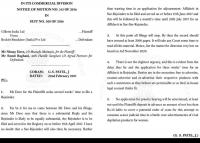 After his Indigo-GoAir order went viral last year, Bombay high court Justice Gautam Patel has delivered another zinger, with this one dripping with even more sarcasm and innuendo, scheduling the next hearing date for 2020 (actually, for late 2020, more than three-and-a-half years from now).
After his Indigo-GoAir order went viral last year, Bombay high court Justice Gautam Patel has delivered another zinger, with this one dripping with even more sarcasm and innuendo, scheduling the next hearing date for 2020 (actually, for late 2020, more than three-and-a-half years from now).
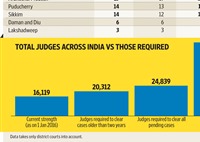
In most years, the annual Joint Conference of Chief Justices and Chief Ministers gets barely a passing mention in media outlets and is forgotten soon after. This year it was different.
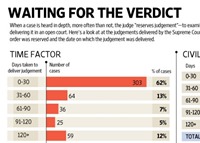
The heavy backlog of cases and delays in the Indian judicial system are once again the topic of much discussion, with everything from government callousness to over-litigiousness to judicial activism being blamed for the 35 million cases pending in the courts at all levels.
A fascinating and depressing story shared on Twitter by a US defence lawyer and collated by Fusion, explains how and why a client pleaded guilty to a charge of assault despite having done nothing wrong.
 So, Chief Justice of India (CJI) TS Thakur today lectured senior counsel Abhishek Manu Singhvi…
So, Chief Justice of India (CJI) TS Thakur today lectured senior counsel Abhishek Manu Singhvi…
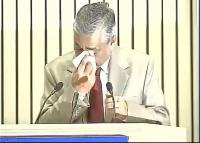 India cannot achieve its economic growth without a robust judiciary overseen by an adequate number of judges, Chief Justice TS Thakur said on Sunday.
India cannot achieve its economic growth without a robust judiciary overseen by an adequate number of judges, Chief Justice TS Thakur said on Sunday.
TERI Pachauri: RK Pachauri, accused of sexual harassment by a former colleague, has returned to TERI in a new role created just for him - executive vice chairman - after a decision by the governing body. (India Today).
Many decade-old cases pending in lower courts: More than 10 per cent of 2,00,60,998 (2 crore) pending lower court cases have been unsettled for longer than 10 years, according to data from the law ministry’s new National Judicial Data Grid, while 41 per cent of cases have been pending for less than two years (PTI).
SC rejects Arunachal Pradesh rebel plea against a Gauhati high court decision upholding the then speaker’s decision to accept their resignations: Senior advocate L Nageshwar Rao, appearing for two rebel MLAs, unsuccessfully told the Supreme Court: “I have never seen such kind of resignation letters in my whole life where the maker cannot take it back. The language of the resignation letters warranted an inquiry by the Speaker. The letters were written under duress and coercion.” (The Hindu).
Headley talks: Terrorist David Headley’s deposition before a special court continued into its second day today over video conferencing, telling judge GA Sanap and special public prosecutor Ujjwal Nikam about how he was not paid by any terrorist outfits to assist in the Mumbai 2008 terror attacks (The Hindu).
Haji Ali woman ban: Bombay high court reserves judgment on banning women from entering inner sanctum of Haji Ali Gurgah in Mumbai (Indian Express).
Justice Rakesh Ranjan Prasad transferred from Jharkhand high court to Manipur high court (PIB).
Google capture failed: A US federal judge threw out a proposed class-action lawsuit against Google alleging fraud for wasting seconds of time of people signing up for a free Gmail account, because half the two-word CAPTCHA does not actually need to be solved... (Ars Technica).
The fastest working out of 13 Supreme Court judges were justices AR Dave, Ranjan Gogoi, Madan B Lokur, JS Khehar and Chief Justice of India (CJI) TS Thakur, while justice Dipak Misra was the slowest according to a basic arithmetic study commissioned by CJI Thakur, reported the Times of India.
CJI Thakur asked the Supreme Court registry to determine how each of 13 judges on the roster had performed in terms of disposal of cases, from July 2015 to December 2015, by simply subtracting the total number of cases the judge disposed of from the number of cases in which the judge issued notice.
The registry also documented the total number of cases before each of the 13 judges.
Other slow judges in the roster, after Dipak Misra, according to the study, were justices PC Ghose, V Sen, Kurian Joseph, F M I Kalifulla, M Y Eqbal, V G Gowda and J Chelameswar. All of these judges, and Misra, added to pendency instead of reducing it.
A Delhi district court settled a 54-year-old property dispute while dismissing a Delhi Development Authority (DDA) plea seeking right over a land in east Delhi. The agency did not came into existence at that time, the court stressed.
The Modi government’s law ministry wants the Supreme Court to disclose greater details about itself, including court-wise pendency of civil as well as criminal cases, number of adjournments in each particular case and sanctioned and working strength of judges to increase transparency in the legal system reported The Times of India.
The suggestions, given with an intent to increase transparency in the appraisal of Judges, were given to the e-court committee of the Supreme Court that operates the National Judicial Data Grid (NJDG).
The government is considering conducting an independent study using the data available through the NJDG to find out the cause of huge pendency in courts; at last count, the pendency in subordinate courts was estimated to be more than 2.65 crore while the total pendency was around 3.10 crore, including those in the SC and HCs.
The government’s demand comes before the Supreme Court is set to announce its verdict on the National Judicial Appointments Commission (NJAC) on which arguments were heard in detail in July this year. Transparency in appointment of judges has been one of the arguments used in favour of the NJAC
Rajasthan 5th state to pass Vexatious Litigation (Prevention) Bill: Heavy costs for 'baseless' cases
The Rajasthan assembly on Monday passed a legislation to curb vexatious litigation, becoming the fifth state in India to do so.
The Rajasthan Vexatious Litigation (Prevention) Bill, 2015, was passed by voice vote, to cover both civil and criminal cases in the high court and subordinate courts.
Introducing the bill, Law and Legal Affairs Minister Rajendra Singh Rathore said: “Rajasthan will be the fifth state to have such an act after Maharashtra, Goa, Tamil Nadu and Madhya Pradesh.”
According to the bill, the tendency to file vexatious litigation was increasing. The courts have shown their anguish by imposing heavy costs on vexatious litigants.
These litigants persistently file baseless cases and misuse the process of law to settle personal scores.
Besides harassing the innocent, these also put strain on the already overburdened judicial system.
“Over 2.28 lakh cases are presently pending in the Rajasthan High Court, and almost 10-15 percent fall under this category,” said Rathore.
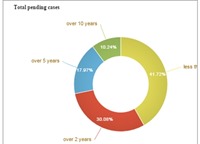 Indian district courts’ complete case pendency records are now available online.
Indian district courts’ complete case pendency records are now available online.
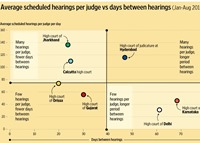 A wide variance exists between how a case progresses through various high courts (HCs), according to a study by Bengaluru-based non-governmental organization (NGO) Daksh aimed at understanding how delays take place in the judicial system and how they affect the delivery of justice.
A wide variance exists between how a case progresses through various high courts (HCs), according to a study by Bengaluru-based non-governmental organization (NGO) Daksh aimed at understanding how delays take place in the judicial system and how they affect the delivery of justice.
